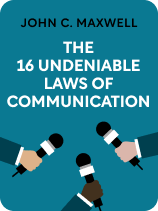

This article is an excerpt from the Shortform book guide to "The 16 Undeniable Laws of Communication" by John C. Maxwell. Shortform has the world's best summaries and analyses of books you should be reading.
Like this article? Sign up for a free trial here.
Do you ever deliver presentations that you don’t really believe in? Do you practice what you preach?
According to John C. Maxwell, effective communication starts with the speaker: Your identity, actions, and values affect the way you speak and how others view you. Before you can sway your audience with your words, you must first win them over with your character.
Keep reading to learn three ways your speaker credibility can be strengthened.
Speaker Credibility
To become a compelling speaker, you must establish your speaker credibility—your trustworthiness and believability. When audiences view you this way, they’ll take you more seriously and will be more willing to consider your message. Maxwell suggests several ways to make yourself more credible.
1. Ensure your message matches your true beliefs. To be credible in the eyes of others, you must genuinely believe in the message you’re delivering. Learn to understand and accept your authentic self so you can communicate your true beliefs with consistency and sincerity. When you’re confident in your message, you naturally use more powerful language and convey more emotion. When your audience believes your words are sincere, they’ll be more open to listening to you.
2. Support your words with your actions. Follow your own advice before giving it to others. Otherwise, you risk people viewing you as a hypocrite, and they may be less likely to listen to you. For example, if you argue that organization is key to productivity, but you display an obvious lack of organization, your audience won’t be receptive to your message.
3. Develop the necessary expertise to speak about your subject. Maxwell writes that you must first learn, build skills, and become knowledgeable in the area you want to discuss. By dedicating time and effort to becoming competent in your field, people will perceive you as more trustworthy and credible when you present your ideas.
| An Appeal to Ethos: Use Your Credibility to Be Persuasive While Maxwell suggests you strengthen your credibility by being committed to your message, others recommend you use ethos, or the rhetorical appeal to character, to demonstrate your credibility to your audience. In Thank You For Arguing, Jay Heinrichs explains that a strong ethos is essential for establishing your audience’s mood and making them open to listening to you. Let’s compare his suggestions on how to use ethos to appear more credible with Maxwell’s suggestions on how to become more credible. 1. Your message and your beliefs. Maxwell advises you to be your authentic self to establish credibility, but Heinrichs suggests that you should focus, instead, on reflecting your audience’s beliefs, values, and appearance. He claims that your audience will trust and like you more if they see you as similar to them. 2. Your actions and your words. Maxwell says that you must back your words with actions to be more credible, but Heinrichs says that audiences tend to be skeptical of speakers who seem too sure of their message. Instead, he suggests you add a level of disinterest or hesitation to your message. For instance, you might discuss how you were eager to never read another book after finishing your education, but that you’ve now taken it up again because of overwhelming evidence that it’s so beneficial. Disinterest makes your audience think that you’re concerned about what’s best for them, writes Heinrichs. 3. Your expertise. Heinrichs agrees with Maxwell that a key component of ethos is to demonstrate your expertise. He offers more specific tips on how to do this during your presentation: Share examples of how you tackled a problem with an unconventional method that a beginner would never think of and, as a result, achieved great success. Your audience then has the impression that you notice things others don’t notice because you know your topic so well. |
Exercise: Be Authentic & Credible at Your Next Presentation
Using Maxwell’s recommendations, strengthen your authenticity and credibility as a speaker and better connect with your audience.
- Think about an upcoming speech or presentation you need to make. Briefly jot down what it’s about.
- Describe the audience you plan on speaking to. What might their primary needs be? How can you connect with your audience and show you care about them and their needs?
- How can you strengthen your credibility so audience members are more receptive to your message? Consider adapting your message so it matches your true beliefs, backing up your words with actions, and learning more about your topic.
- How can you expand your reference base to better understand your topic? Maxwell suggests you study others or grow your knowledge by exploring topics and having new experiences.

———End of Preview———
Like what you just read? Read the rest of the world's best book summary and analysis of John C. Maxwell's "The 16 Undeniable Laws of Communication" at Shortform.
Here's what you'll find in our full The 16 Undeniable Laws of Communication summary:
- The secrets to becoming a confident and effective communicator
- How anyone can master public speaking, no matter how nervous they get
- How to write a clear and engaging speech






